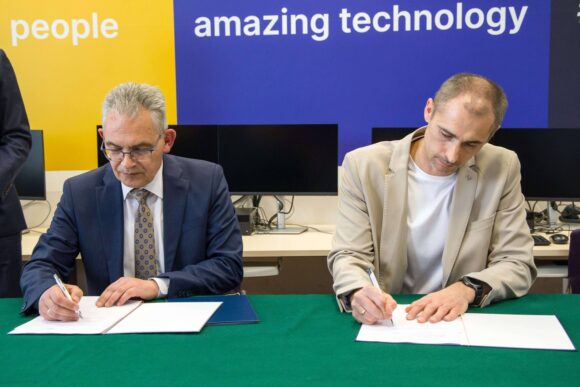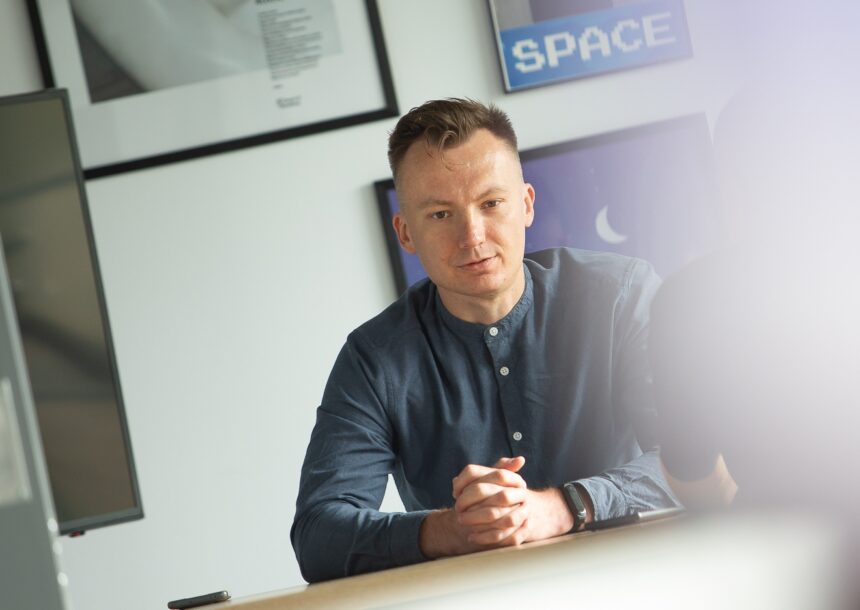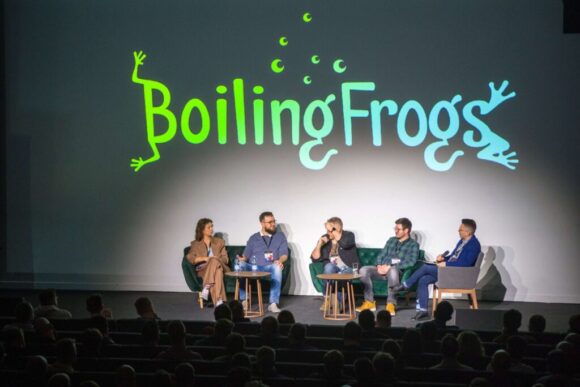
I translate human language into a technical one. A conversation with Wojtek, Systems Analyst at AUCTANE

5 years in the same department, in the same team, in the same position. Can such a job get boring? Wojtek, who is successfully developing as a Principal Systems Analyst in the Dragons team, is celebrating his fifth birthday at AUCTANE this year. How does he remember his early days, what keeps him with us and why he’s not thinking of changing his position? Find out.
Wojtek, we know that you have been with us for 5 years and that you have been working in the development department since you joined us. Tell us what exactly your team does.
Our job as a team is to take care of applications and services. We have a wide variety of products under our care, on the one hand we have a large monolithic application that was developed a long time ago, and on the other hand – we have a lot of microservices. Of course, the maintenance of one is different from the other, while our job is to keep all these products alive and to implement new functionalities that are necessary for us to remain competitive in the market of similar products.
In your team you work as a Principal Systems Analyst. Please translate what that means in Polish 😉
A Systems Analyst is the person who stands between the people who order things from us, i.e. between the stakeholders and our developers. Such an order comes to us from other teams, because the moment there is a need to implement a new solution, whether it is initiated by our team or by the customer as a user of our platform, such an order first goes through the relevant departments in the company and finally comes to us as a new task.
My role, to put it very colloquially, boils down to translating issues from human language, i.e. natural language, to technical one, the language of computer nerds (laughs). Of course, this communication goes both ways, i.e. I translate into technical language, but it also happens that I translate in the other direction. For example, when I am writing documentation for one of the services, or when we are demonstrating something to people who are not necessarily technical, because their role in our organisation is to know the business context, not to know how to implement a particular functionality.
Also read: Changes are good and stimulating. Interview with Ela from Customer Support
5 years of translating and interpreting. Doesn’t this kind of work get boring?
No. It may sound very corporate, but in my job every day is different, brings new things, practically no two days are the same. One of the things about my team is that we get a lot of different problems, which is probably not the case with other teams. I should also add that working at AUCTANE is my first job in IT. I have never been exposed to the industry before and I have no training in the field. During my work, I have often been confronted with problems that were new to me and that I had never heard of before. In such a situation, it is difficult to fall into a routine.
I also see progress over time. I remember the early days when my job was to prepare meeting notes and I had to write down some terms phonetically so I could Google them later (laughs). Although I speak English well, the IT industry has its own specific slang. There’s a reason it’s called programming languages, because they’re actually languages that you just have to learn. Some terms are polonised, inflected and sound like a foreign language. I remember in one of the meetings in my first week on the job, someone threw in that there was a place in the code where you had to do a ‘trajkecz’. I had to write it down phonetically, and only later did I realise that the cluster consisted of two commands – ‘try’ and ‘catch’. Something that belongs in every programmer’s primer.
This was one of the experiences that made me realise that to do this job well, I needed to learn programming myself. At least to the extent that I could understand the language, learn to use it, speak it, and sometimes even write it.
You mentioned your beginnings, so let’s go back in time. How did you cme to work in AUCTANE? Did you know about the company before or did you come across us during the recruitment process?
I knew a little about the company, mainly through friends who had worked there. We talked about how they liked AUCTANE, but only in a social context. They said it was a good place, interesting, told various anecdotes, so I knew that such a place existed on the map of employers in Zielona Góra and that it was interesting. I also started to be interested in programming myself, which at that point in my professional life was more due to the fact that I was starting to get a bit bored and was looking for something new for myself, some kind of development opportunity. I came to the conclusion that I needed some fresh air in my life, and I knew that a job change could be one of those things.
However, I am an introvert and job interviews stress me out. But I decided to approach the recruitment process on a tame, new experience basis, recognising the principle that the best thing to do in such situations is to expose yourself to the stress factor. At the same time, AUCTANE itself approached me, so I thought it would be a good opportunity to practice without the pressure of having to get the job. After two interviews I got the offer and that’s when I was faced with the dilemma (laughs). Sometimes two natures are fighting inside you. One wants to move on and the other one, holding on to your shirt, says: “Stay in your comfort zone, it’s so comfortable here”.
Fortunately, you chose to listen to the former.
Yes, I made the decision to change jobs and I don’t regret it, because it has proved to be a development for me in many ways. On the one hand, as I said, I’m learning new things and on the other hand, I’m getting to know a different dimension of work. In my previous company, the environment was different, it was international, but still different. The atmosphere was also different, a bit more formal. At AUCTANE it’s less formal, looser, more relaxed, which is certainly conducive to development.
So it all fell into place and you ended up here. Are you already thinking about your future, the changes you would like to make, or are you happy where you are?
I’m a very peculiar person when it comes to career issues, because I never had a rigid career plan. That’s why it’s always difficult for me to answer the question of where I see myself in five years’ time. I try to keep an open mind, observe what’s going on around me, what I enjoy. I discovered that interacting with code is one of those things. Analysing code, trying to figure out how it works and coming up with a solution is something that relaxes me a lot. I use other skills in my team and I have professionals around me who are much better at working with code, but whenever the opportunity arises, I take on tasks that allow me to grow in that direction as well. So maybe this will be the next step, so there will be more of these tasks, but related to coding.
For the time being, I continue to swim forward. I’m swimming, not drifting, because you’re swimming in a certain direction, even if you haven’t planned everything and sometimes you have to change your swimming style. It’s certainly better than drifting, which is when others make the decision for me, and that’s what I’m trying to avoid.
In that case, we wish you successful waters and winds, so that you always swim in the direction that gives you satisfaction and pleasure. Thank you for this interview.
Thank you very much.
